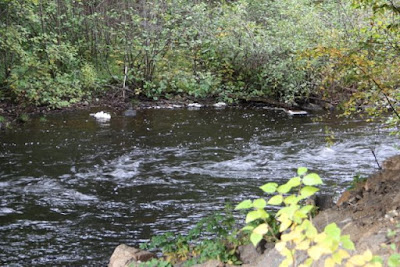As for the problems related to agricultural pollution, the Initiative Foundation's magazine has some current statistics and portraits of Central Minnesota farming in their Still Growing story.
 |
| the way we treat our land affects our water
Photo by J. Harrington
|
Worthwhile background on how we (both farmers and eaters) ended up here can be found in this reflection on the impact of Mr. "Get Big or Get Out." Is it about feeding people, or about supporting big agribusiness?
The aspects I find most distressing are that Minnesotans, through the 2008 Legacy Amendment, decided to tax ourselves for the sake of our environment because, in part, for years cities and industries (except agriculture) invested more and more to clean up their wastewater while agriculture keeps using more and more of our common waters and returning them unfit for many other uses. I don't know of any farmer who appreciates strangers leaving closed gates open or closing gates a farmer left open on purpose. Yet too many farmers think they're entitled to use or drain water and dump it without treatment, unless we pay them to not pollute.
According to this analysis in the Vermont Law Review, Minnesota has options it is only beginning to use:
"Part IV considers two promising approaches under the Clean Water Act: (1) the Act’s requirement that states identify all waters within their boundaries that remain “impaired” by any source, including pollutants originating from nonpoint agricultural operations; 13 and (2) the possibility that some agricultural activities might still be labeled as “point sources,” and as a result, be subject to federal effluent permit requirements. 14"The Des Moines Water Utility is trying to achieve some of the second option in court. The Star Tribune series makes it clear it's past time to for Minnesota to act assertively on the first option.
As you drive around leaf-peeping over the next few weeks, notice the combines and tractors harvesting field corn and soy beans, consider the failed promises made by Secretary Butz, and perpetuated by many other politicians committed to continuing our "cheap food" policies by protecting agriculture from the kind of regulations all the rest of us have to comply with. Ask yourself if "cheap food" is any good if there's no water clean enough to drink with our meals. We need, and can have, a more balanced solution. We should be neither the world's policeman nor the world's food bank if the cost is more than we can afford. We reached those points years ago.
 |
| North Country forest stream
Photo by J. Harrington
|
Forestry is learning that clear-cuts along rivers aren't wise or acceptable if the water is to be protected. Ranchers are learning to fence cattle out of stream beds to protect water sources. Farmers who can't afford swimming pools should do more to protect swimming holes for their children while those who can afford swimming pools should open their pools at least a couple of days a week to all who live downstream. Seems fair, doesn't it? Think about which country is buying large hog CAFOs and whether the smelly, polluting by-product of hog raising should go to the owners along with the profits from the meat sales. This isn't about the "family farm" as much as big would have us believe.
A Colander of BarleyBy Tami Haaland
The smell, once water has rinsed it,is like a field of ripe grain, or the grain heldin a truck, and if you climb the steel side,one foot lodged on the hubcap, the otheron the wheel, and pull your body upward,your hands holding to tarp hooks, and lift toesonto the rim of the truck box, rest your ribsagainst the side, you will see beetlesand grasshoppers among the hulled kernels.Water stirs and resurrects harvest dust:sun beating on abundance, the moist heatof grain collected in steel, handsplunging and lifting, the grain spilling back.
********************************************
Thanks for visiting. Come again when you can.
Please be kind to each other while you can.
No comments:
Post a Comment